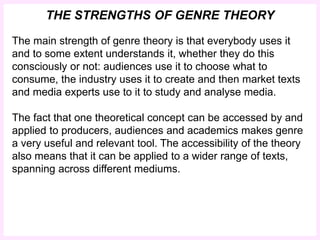Genre is a dynamic process that evolves over time through subgenres and conventions. Theories of genre discuss how genres develop through stages from experimental to classic to parody to deconstruction. Genre operates within industries, audiences and culture - industries use genre to sell products and audiences use genre to choose what to consume. The main strength of genre theory is that it can be accessed and applied by producers, audiences and academics to study media texts across different mediums.

![BARRY KEITH GRANT [1995]
In 2001 Daniel Chandler argued that genre is used to refer to a
specific ‘type’ of text. Barry Keith Grant takes this further, discussing
how subgenres emerge within genre so that the different categories
are more specific. This then allows the audience to identify with
them more closely and therefore the subgenres become more
recognisable.
STEVE NEALE [1995]
Neale recognised that genres are not systems but ‘processes of
systematisation’ meaning they’re dynamic and continually evolve
over time. For example the conventional vampire figure was
established in FW Murnau’s 1922 Nosferatu. Then it changed
completely in the 1994 film Interview With the Vampire – the
vampire became the antagonist, the victim rather than the villain.
This demonstrates how conventions change to create new and
original ideas and also to reflect the developing ideologies of the
time.](https://image.slidesharecdn.com/genre-141103051255-conversion-gate02/85/Genre-2-320.jpg)
![CHRISTIAN METZ [1974]
Similarly to Steve Neale, Metz also talked of genres
developing and transforming over time in his book Language
and Cinema. He talked of four stages that that genres go
through in their life cycle:
• Experimental Stage
• Classic Stage
• Parody Stage
• Deconstruction Stage (which can lead to hybrids)
DAVID BUCKINGHAM [1993]
Another theorist who continues to support the idea of genre
not being fixed was Buckingham. He argued that genre is not
simply ‘given’ or provided by the culture. Instead it is a
constant process of negotiation and change.](https://image.slidesharecdn.com/genre-141103051255-conversion-gate02/85/Genre-3-320.jpg)
![JASON MITTELL [2001]
Mittell described how genres are cultural categories that surpass the boundaries of
media texts and operate within the industry, audience and cultural practices as well.
Industries use genre to sell products to audiences and media producers use familiar
conventions that often make cultural references to their audience’s knowledge of
society or other media texts. Genre also allows audiences to make choices about
what products they want to consume through the desire to fulfil a particular pleasure
or need. This is better illustrated in the diagram below:
GENRE
(conventions)
includes uses reads
Institution produces Text read by
Audience
Essentially what this means is that genre does not stay within the text itself –
institutions are aware of it in order to create a product and audiences are aware of it
in order to consume a product.](https://image.slidesharecdn.com/genre-141103051255-conversion-gate02/85/Genre-4-320.jpg)
![RICK ALTMAN [1999]
Altman discussed the different pleasures that genre films
provide for audiences:
Emotional
Refers to an emotional response generated from the audience;
they’re particularly significant when the response is strong.
Visceral
Refers to a physical or sensory experience or pleasure e.g.
revulsion.
Intellectual
Refers to pleasure received from trying to unravel plots or
decipher mysteries.](https://image.slidesharecdn.com/genre-141103051255-conversion-gate02/85/Genre-5-320.jpg)
![DAVID BORDWELL [1989]
Bordwell’s theory was focused on genre themes – he claimed that ‘any theme may appear in any genre’. For
example horror films are modern fairy tales, moralistic stories where people are punished for breaking society’s
rules. They usually contain the following themes:
• Fear of the unknown – anything foreign or different is seen as ‘monstrous’ and therefore scary
• Sex = death – sex is often demonised (especially in Slashers); those who have sex end up dead, werewolves
can be seen as a metaphor for puberty, vampires for rape or sexually transmitted diseases etc.
• Breakdown of society – post-apocalyptic themes, the fear of or secret wish for the collapse of society that will
cause humanity to revert to its basic instincts
• The duality of man – the conflict between natural, animalistic instincts and civilised side e.g. Jekyll and Hyde,
werewolves, the Hulk etc.
• Segregation and Alienation – two opposing cultures/beings trying to survive
Music videos often have youthful/teenage themes to appeal to their main audience:
• Teen angst
• Rebellion and conformity
• Romance
• Sex or loss of virginity
• Nostalgia for innocence
• Nihilism
• Coming of age rituals e.g. prom
• Tribalism and popularity
• Bullying
• Juvenile delinquency and moral panics
• Currency of ‘cool’
• Hedonism
• Friendship
More general themes in music videos could also include war, poverty, love, death, capitalism, racism etc.](https://image.slidesharecdn.com/genre-141103051255-conversion-gate02/85/Genre-6-320.jpg)
